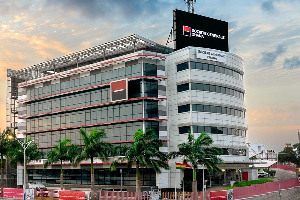- Home - News
- TWI News | TV
- Polls
- Year In Review
- News Archive
- Crime & Punishment
- Politics
- Regional
- Editorial
- Health
- Ghanaians Abroad
- Tabloid
- Africa
- Religion
- Election 2020
- Coronavirus
- News Videos | TV
- Photo Archives
- News Headlines
- Press Release
General News of Tuesday, 19 November 2002
Source: John Mahama
Minority Perspectives On State Of The
Last Tuesday, the Hon. Minister for Finance presented a statement on the state of the national economy to Parliament. The statement had been much anticipated. Indeed it was scheduled to have been presented the Thursday before and the Minority was very much irked when it was announced that Thursday, that the Minister could not be in the House because he was indisposed.
The contents of the statement itself could be discerned from the minister’s body language. He was more subdued and sober than he was when he read the mid-year review budget of 2001 and the budget statement of this year – 2002. While in both the mid year-review of 2001, and in the budget statement of this year, the minister had been very ebullient about his achievements in restoring macro-economic stability, he was more reticent this time round. The defining statement of the presentation was when the Minister indicated that the budget was on track but facing many challenges. To the expert eye this was surely a sign that all was not well with the economy.
Of course the positive news was that inflation and interest rates are still on the decline and that agricultural production in terms of staples is much better this year as a result of a better rainfall pattern than the previous year. While this should make us happy, it is necessary to keep an eye on the more worrying signs that have shown up in the mid-year review.
Democracy Dividend
In 2001 Ghana made history when it managed a very successful transition in which one President belonging to one political party handed over the reins of government to a new president belonging to a different political party. The euphoria that greeted this transition created a lot of goodwill both domestically and internationally. This goodwill translated into net financial inflows amounting to almost 10% of GDP. These inflows largely represented releases from donor programmes that had been curtailed in the latter years of the NDC Government. A smaller percentage of this came from the tourism sector and increased remittances from abroad. This significant resource inflow is christened the “democracy dividend” by the centre for Policy Analysis (CEPA). Naturally this contributed in no small way to stabilizing the economy and the currency in the first year of the NPP’s stewardship.The true challenges of managing a developing economy have come in the present year. Greater depreciation in the value of the cedi, higher than programmed domestic borrowing, low rate of external inflows, reduced foreign direct investment, burgeoning Tema Oil Refinery (TOR) debt as a result of decreased political will to adjust price of petroleum products, increasing arrears in statutory payments, burgeoning imports vis a vis stalled export growth and poor growth in revenue collection in real terms, reduced tonnage in cocoa exports. These are some of the challenges that we need to advert our minds to if macro-economic stability is to be sustainable.
Currency Slippage
The cedi slipped on average nearly 13% in value against the US dollar. This is even the case in a year where the US Dollar value itself has depreciated against the yen, the euro and other international currencies. The cedi’s slippage against currencies like the pound sterling was much worse this year. This depreciation is significant when compared with the only 3.6% loss in value registered by the cedi in year 2001. While the effect in curtailing imports should not be lost on us, the currency depreciation creates a situation of imported inflation. Many industries that depend on imported raw materials have to jack up prices in order to cover their costs. Importers also adjust prices to cover the increased cost of FOREX. This accounts for the higher than average increase in prices of some basic commodities with high import content such as milk, bread, tinned fish, sugar etc.Increased Domestic Debt/ Low External Inflows
Domestic borrowing was up. Indeed government overshot its target in terms of domestic borrowing by more than 200%. This was principally due to a shortfall in external inflows. In excess of ?1.5 trillion was borrowed from the domestic banking sector. This causes the ‘crowding out’ effect whereby there is reduced access to credit by the local private sector as a result of large borrowing by government. Indeed this was a phenomenon for which the NPP was very critical of the NDC while in opposition.There was a shortfall in external inflows. Considering that the budget is still almost 50% funded by external donor inflows, this shortfall affected budgetary targets. The Consultative Group meeting held in Ghana early this year achieved pledges of about $750 million and another $250 million in HIPC debt relief. Programmed inflows have been slow in coming because of the difficulty in meeting agreed benchmarks. Some of these benchmarks include full cost recovery for utility services, full cost recovery for petroleum products, sale of Ghana Commercial Bank, privatization of ECG and TOR, realization of $80 million in divestiture receipts, increase in VAT rate from 12.5% to 15%, among others. Meeting these benchmarks has not been easy. Indeed it is speculated that disagreements on Ghana’s progress in respect of these benchmarks led to a breakdown in negotiations between Ghana and the IMF during the last board meeting held in Washington this summer.
Achieving support of the IMF/World Bank for a country’s programme is critical, because most of the bilateral donors take their cue from the Bretton-Woods institutions. A stalled programme with the IMF often leads to a cessation or slow down in programmed ODA by bilateral donors. If there isn’t a quick movement to remove the obstacles blocking the external donor pipe, Ghana’s economic programme could be further thrown out of synch.
Reduced FDI
This reduction in external inflows to a smaller extent is caused by reduced levels of foreign direct investment (FDI). From a high point of about $233 million in 1999, FDI declined to about $170 million in 2000, and further declined to only about $96 million in 2001. While figures for 2002 are not conclusive, there has been a drop of 40% in FDI recorded by the Ghana Investment Promotion Centre (GIPC) in the 1st half of the year compared with the same period last year. This is part of a global trend following 9/11 where there has been a sharp drop in FDI globally. However, local factors such as excessive red tape, uncertainty about government policy direction in some sectors, and reckless handling of disputes with existing investors, have also contributed in no mean way to the reduced levels of FDI. It would appear that the President’s numerous trips abroad have not










